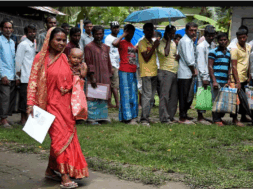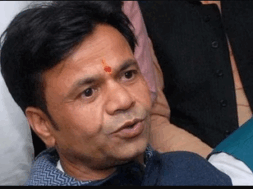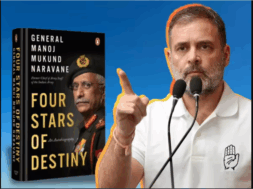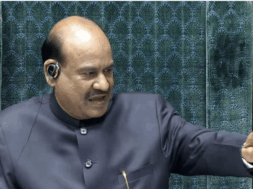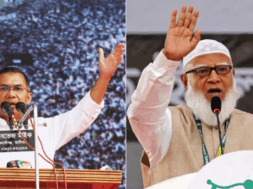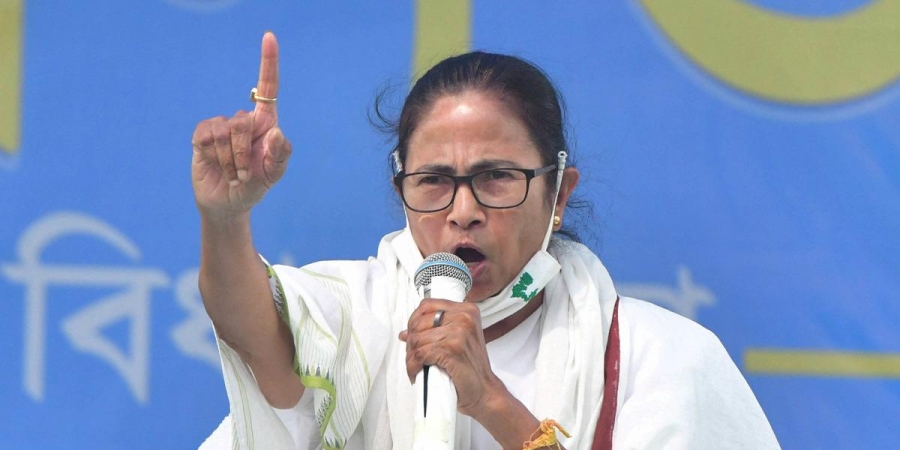
Manas Dasgupta
NEW DELHI, May 2: Sending a huge wake up call to the prime minister Narendra Modi, the West Bengal voters have retained the government of Trinamool Congress led by Mamata Banerjee for the third time rejecting the BJP’s “offer” of converting the eastern state into “Sonar Bangla” bring about “a real change.”
While the final results of the assembly elections in the four states of Assam, West Bengal, Tamil Nadu, Kerala and the union territory of Puducherry are yet to come, the trend seen till late evening give clear indication that the BJP was all set to retain Assam, the left-led alliance headed by the CPM to stay on in Kerala for the record second consecutive term, DMK-Congress alliance is certain to upstage the AIADMK-BJP alliance in Tamil Nadu and the BJP-led alliance is set to form the next government in Puducherry where the Congress government collapsed three months ago making way for the imposition of the president’s rule till the elections.
But the biggest loser in the current round of elections was Modi who had thrown all his weight and the entire political and monetary might of the BJP in West Bengal to oust the regional leader. In the fight between the prime minister of the country and a chief minister of a state, the chief minister emerged the winner and with flying colours further improving the party’s vote share as well as the number of seats it had won in 2016. Perhaps no other prime minister in the past have allowed himself to be involved so deeply in a state Assembly election and turn out to be a loser as Modi did this time. Though carrying Modi’s image the BJP won in Assam and Puducherry, its total rout in West Bengal, defeat along with the AIKDMK in Tamil Nadu and failure to even open its account in Kerala give indication that the “Modi magic” may finally be diminishing, particularly because of the centre’s alleged “mishandling” of the Covid situation.
But while Covid mishap may have contributed in the BJP’s bad showing in West Bengal in the final two phases of polling when the spread of the infection was at its peak in most part of India, it can not be the sole reason for the party’s poor performance in the two southern states where the polling was over before the second wave hit the country in the second week of April.
In fact, the improved performance of the BJP in West Bengal in the 2019 Lok Sabha elections gave the party the false confidence that it was not only ready to enter West Bengal but with “consolidation” of the Hindu votes was all set to overthrow the regional party from power. The party kept bragging about winning more than 200 seats in the 294-member state Assembly but ended up in the region of just 75 seats, though it showed marked improvement from just three seats it held in the outgoing House. But by the 2019 Lok Sabha election margin, the BJP even it only retained its hold should have won at least 116 seats but failed to repeat the performance.
Modi’s now infamous sloganeering of calling their chief minister “Didi-O-Didi” which the BJP supporters claimed was indicative of how much the prime minister was showing “respect” to his one woman army rival, and the union home minister Amit Shah’s branding the TMC’s decade-long rule as “goonda raj” apparently has not been liked by the West Bengal voters. The party’s strategy to try to break the TMC by luring away some its senior members and giving them ticket apparently has also misfired as most of the TMC turn-coats this time representing the BJP have been rejected by the voters.
It was clear that the BJP’s gains in West Bengal was only at the cost of the left parties and the Congress which stood totally decimated but the party could not transfer a single TMC vote to its bank which actually mattered. The Congress-Left parties together held about 80 seats in the outgoing House which this time has gone to the BJP, but the TMC is all set to further improve its tally of the massive 209 seats it won in 2016 and may end up in the region of 215 seats. Unless the BJP can transfer a substantial amount of the TMC votes to its kitty, its capturing power in “Sonar Bangla” will remain a pipedream.
In Tamil Nadu, MK Stalin is set to become the state Chief Minister with the DMK-led alliance leading in over 140 seats in the 234-member Assembly. In Kerala, the Pinarayai Vijayan-led LDF government looks set to create history by becoming the first government to fight incumbency and retain power in the state.
The Congress, meanwhile, had a dismal performance in the state, with the UDF leading in only 41 seats at present.
In Assam, the BJP is set to have a second term with the party’s alliance leading in 76 of the 126 seats while the Congress alliance is leading in 48. In Puducherry, the NDA alliance is inching towards the halfway mark in the 30-member Assembly with leads in 12 seats.
The elections were held amid a surge in Covid-19 cases across the country – a second wave that has ridden the country to an unprecedented crisis.
Prashant Kishor, the political strategist of the TMC who on the face of the BJP’s tall clams hang on with his prediction that the party at no cost would cross the double figure mark, said the TMC went through hell as the Election Commission allowed the BJP to do whatever they wanted to do. “The EC acted as an extension of the BJP. They have been blatantly partial. They did everything that they could have done on their part to help BJP win Bengal,” Kishor said. “Whether 200 or 190… to my mind all what BJP was trying to do was build up a massive propaganda that they are winning in Bengal” so that the voters were carried away, he said.
In Nandigram, considered the epicenter of the West Bengal elections, though with a slim margin, Mamata Banerjee managed to defeat her one-time close ally and this time the BJP rival Suvendu Adhikari who virtually led the TMC short-lived flush towards the BJP. The margin was slim, just about 1,200 votes, but the victory was huge as Mamata leaving the comfort of her home seat Bhabanipur contested from Adhikari’s stronghold of Nandigram to set an example and confidence among the TMC rank and file.
Suvendu Adhikari has vowed to quit politics if he didn’t defeat Mamata Banerjee by more than 50,000 votes. Taunting his former mentor, Adhikari had also asked her to be ready with a letterhead that says: “Former chief minister”.
Though only one of the five states and union territory going to the polls simultaneously, West Bengal’s this time was a national election. For the past one year, Team Modi-Shah threw all their weight into winning the state. Some say that if Bengal hadn’t voted this year, we might have seen more governmental attention to the COVID crisis. Having used up all its political oxygen on the state, it was imperative that the BJP won West Bengal.
As it turns out, not only did the BJP not manage to consolidate on its 2019 gains, it failed to even hold on to that vote share. This is the exact opposite of what the Trinamool managed in 2011. The Trinamool’s alliance with the Congress party had put up a massive challenge to the Left two years before that in the Lok Sabha elections of 2009. It created a sort of bandwagon-effect, giving fence-sitters the confidence to switch to Mamata in the 2011 assembly polls.

